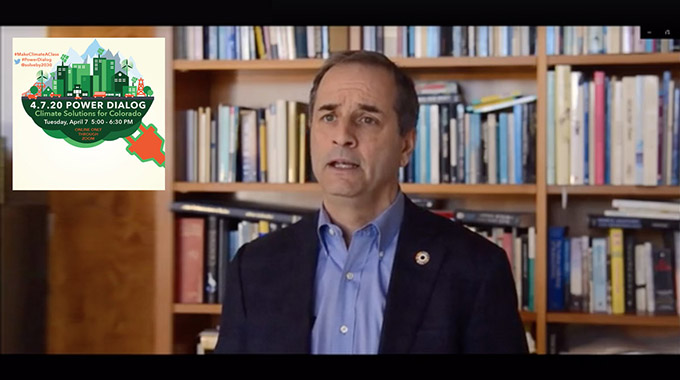
Getting people to care about climate change as the COVID-19 pandemic sweeps the globe is tough—but not impossible, several Colorado political and environmental leaders said during a webinar Tuesday hosted by CU Boulder.
“Power Dialog: Climate Solutions for Colorado” was hosted by Associate Professor of Environmental Studies Max Boykoff, Associate Professor of Communication Phaedra Pezzullo and engineering undergraduate student Andrew Benham. Similar events were hosted by universities nationwide. At least 251 people tuned in from across the state for the event.
The recorded webinar, plus subject-area online resources, will be available through May.
Here are five key takeaways:
1.) We could have imagined this future
COVID-19 is giving us a stark lesson about what happens when we ignore warnings from science, and our systems are vulnerable to extreme events, as COVID-19 has revealed, said Eban Goodstein, director of the Center for Environmental Policy at Bard College in New York and organizer of this national webinar series.
“We need to listen to and trust scientists, and act on their knowledge sooner rather than later,” Goodstein said.
For example, relying on sound science to make policy decisions has made a huge difference in the number of deaths in South Korea compared to the United States. Both countries saw their first case reported on the same day.
“In the same way, the sooner we act on climate change, the better our global outcomes can be. The longer we wait, the more work it will take to address,” said Pezzullo.
2.) Environmental health is directly tied to human health
As reported by The New York Times, air pollution makes negative health impacts of COVID-19 worse. And improving air quality improves both public health and reduces greenhouse gases, Pezzullo noted.
“Clean air action should be integral to our COVID-19 Colorado and climate change response,” Pezzullo said.
Panelist and former Colorado Gov. Bill Ritter said this means addressing the extraction of natural gas through hydraulic fracturing, or fracking, which contributes to the state’s poor air quality.
3.) The importance of a ‘just transition’
Environmental justice was mentioned by every person on the webinar, host or panelist. Founded by Gov. Jared Polis, Colorado is the first state to have created a Just Transition Office “to think about communities that have been left behind” as a result of climate change, and offer opportunities to transition into green jobs.
Both Ritter and Pezzullo said we need to bring people along as we create solutions to both climate change and COVID-19.
“We need to include more Latinx, indigenous, and non-white voices who have been disproportionately impacted by polluting industries in our dialogues about climate,” said Pezzullo.
It’s important that we listen to communities directly about what a just transition looks like, in the same way we are listening right now to health care workers on the front lines, added Jorge Figueroa, a Water Education Colorado board member who runs El Laboratorio to promote agricultural and food security in Puerto Rico after Hurricane Maria.
“Climate change isn’t being taken seriously by those not at the front lines,” he said.
4.) We are capable of radical change
The challenges ahead of us are not insurmountable, noted Ritter. In the past 10 years, he noted, Colorado has made enormous progress in making its electricity sector more efficient. He said we have the chance now to choose how we create new jobs in the industrial, transportation, and agriculture sectors.
“This is a dual challenge that can be solved together,” said Ritter.
He also said we could and maybe should maintain certain elements from the behavioral changes we’ve had to make from dealing with COVID-19, such as traveling less.
“COVID-19 has proven the world is capable of radical behavioral change in a relatively short period of time if we are convinced lives depend on it,” said Pezzullo.
5.) Local level changes will make the difference
When it comes to the pace of the energy revolution, it will be focused in your state and city, Goodstein said.
“The most powerful thing you can do to solve climate by 2030 is to join the campaign of a candidate that shares your vision of climate solutions for the future,” he said.
Teachers of all disciplines are encouraged to use this webinar to “make climate a class,” and help refocus the nation and the world on the challenge that still lies beyond COVID-19: climate change, Goodstein said.
The Colorado webinar hosted by CU Boulder was co-sponsored by the Colorado Energy Office, the Conference on World Affairs, the Center for Science and Technology Policy Research, the Boulder Faculty Climate Science & Education Committee, the Media and Climate Change Observatory, and Inside the Greenhouse at CU Boulder.

